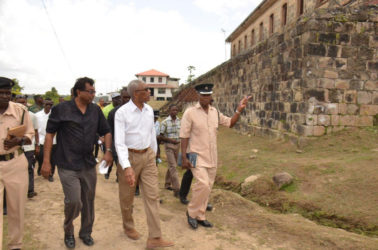The Mazaruni Prison in Region Seven is poised for renovations which will see some of the prisoners from the packed Camp Street facility in Georgetown being accommodated there.
At the post-cabinet press briefing yesterday, Minister of State, Joseph Harmon said that the contract has been awarded through the Ministry of Public Security for the construction of living quarters at the facility.
He said that Lot 1 of the project would be undertaken by A. Nazeer & Sons Contracting at a cost of $28.1M while Lot 2 has been awarded to R. Kissoon Contracting Service for the sum of $30.4M.
A contract has also been awarded to Vikab (Guyana) Limited for the sum of $26.5M to provide consultancy services for the design of the expansion of the Mazaruni Prison.

Asked how many additional prisoners the government would be catering for, Harmon could not give a figure.
He said that a huge portion of the work would entail renovation and noted that the Mazaruni prison exists on 20 acres of land. The work also includes the construction of a fence.
He pointed out that the facility caters for living quarters for the prison officers, blocks for the inmates and land for agricultural development.
According to him, government is trying to make better accommodation for the prisoners “in keeping with the standards obtained around the world.”
He told the media that although they are prisoners, “they still have to be treated as proper human beings. Therefore,” he said, “the condition that we provide for them in the facilities would be upgraded and the security would be strengthened.”
The upgrading of the prison follows a visit by President David Granger and Minister of Public Security, Khemraj Ramjattan on March 6, 2016. The visit was part of government’s search for a long-term solution to the problems of the prison service which saw 17 inmates dying in a fire at the Camp Street facility.
Harmon said that they recognized that there was need for improvement for the prison officers as well. He pointed out that one trip for the officers to travel home cost one third of their salary.
As such, government tries to provide facilities for them to become a little more self-sufficient and cut the extra spending on dietary supplies.




